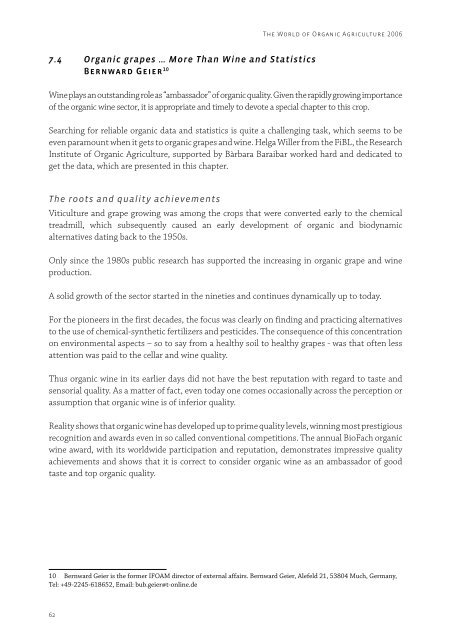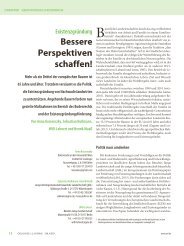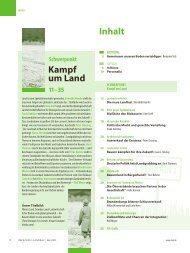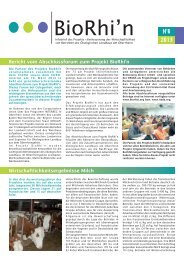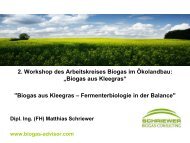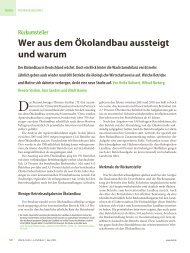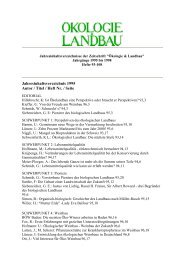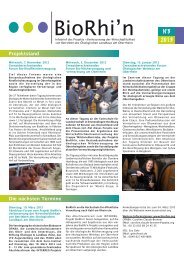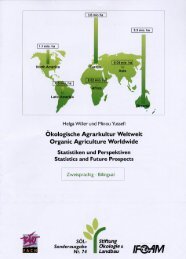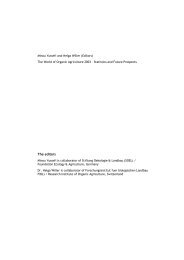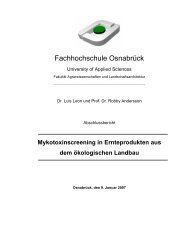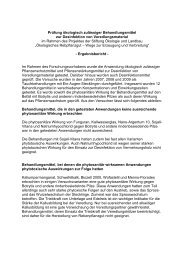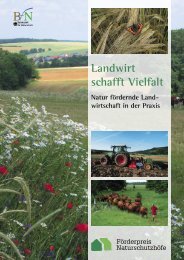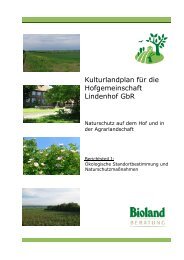the world of organic agriculture - Organic Eprints
the world of organic agriculture - Organic Eprints
the world of organic agriculture - Organic Eprints
You also want an ePaper? Increase the reach of your titles
YUMPU automatically turns print PDFs into web optimized ePapers that Google loves.
7.4 <strong>Organic</strong> grapes … More Than Wine and Statistics<br />
Bernward Geier 10<br />
62<br />
The World <strong>of</strong> <strong>Organic</strong> Agriculture 2006<br />
Wine plays an outstanding role as “ambassador” <strong>of</strong> <strong>organic</strong> quality. Given <strong>the</strong> rapidly growing importance<br />
<strong>of</strong> <strong>the</strong> <strong>organic</strong> wine sector, it is appropriate and timely to devote a special chapter to this crop.<br />
Searching for reliable <strong>organic</strong> data and statistics is quite a challenging task, which seems to be<br />
even paramount when it gets to <strong>organic</strong> grapes and wine. Helga Willer from <strong>the</strong> FiBL, <strong>the</strong> Research<br />
Institute <strong>of</strong> <strong>Organic</strong> Agriculture, supported by Bàrbara Baraibar worked hard and dedicated to<br />
get <strong>the</strong> data, which are presented in this chapter.<br />
The roots and quality achievements<br />
Viticulture and grape growing was among <strong>the</strong> crops that were converted early to <strong>the</strong> chemical<br />
treadmill, which subsequently caused an early development <strong>of</strong> <strong>organic</strong> and biodynamic<br />
alternatives dating back to <strong>the</strong> 1950s.<br />
Only since <strong>the</strong> 1980s public research has supported <strong>the</strong> increasing in <strong>organic</strong> grape and wine<br />
production.<br />
A solid growth <strong>of</strong> <strong>the</strong> sector started in <strong>the</strong> nineties and continues dynamically up to today.<br />
For <strong>the</strong> pioneers in <strong>the</strong> first decades, <strong>the</strong> focus was clearly on finding and practicing alternatives<br />
to <strong>the</strong> use <strong>of</strong> chemical-syn<strong>the</strong>tic fertilizers and pesticides. The consequence <strong>of</strong> this concentration<br />
on environmental aspects – so to say from a healthy soil to healthy grapes - was that <strong>of</strong>ten less<br />
attention was paid to <strong>the</strong> cellar and wine quality.<br />
Thus <strong>organic</strong> wine in its earlier days did not have <strong>the</strong> best reputation with regard to taste and<br />
sensorial quality. As a matter <strong>of</strong> fact, even today one comes occasionally across <strong>the</strong> perception or<br />
assumption that <strong>organic</strong> wine is <strong>of</strong> inferior quality.<br />
Reality shows that <strong>organic</strong> wine has developed up to prime quality levels, winning most prestigious<br />
recognition and awards even in so called conventional competitions. The annual BioFach <strong>organic</strong><br />
wine award, with its <strong>world</strong>wide participation and reputation, demonstrates impressive quality<br />
achievements and shows that it is correct to consider <strong>organic</strong> wine as an ambassador <strong>of</strong> good<br />
taste and top <strong>organic</strong> quality.<br />
10 Bernward Geier is <strong>the</strong> former IFOAM director <strong>of</strong> external affairs. Bernward Geier, Alefeld 21, 53804 Much, Germany,<br />
Tel: +49-2245-618652, Email: bub.geier@t-online.de


